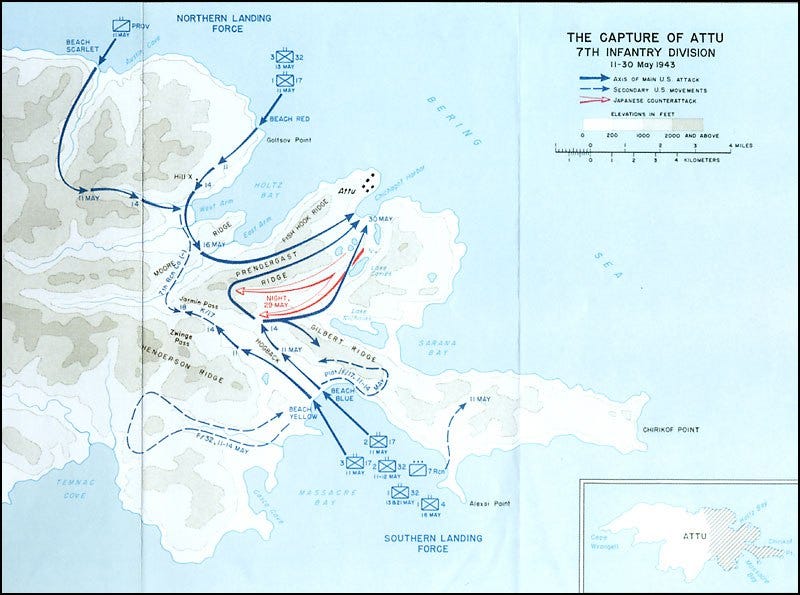Attu: Japan's last desperate charge
The American flag flew triumphant this Memorial day over the rocky ridges of Attu Island.
That was the lead on the Associated Press story that ran in hundreds of newspapers Monday, May 31, 1943, in a report datelined the previous day out of Washington, D.C. It was based on War Department communiques, and the message they conveyed was succinct: "Except for snipers, this enemy force was annihilated."
For a full picture of what actually happened on the tiny island far out in the Aleutians, the American public would have to wait another couple of weeks. That was when the dispatch filed by Associated Press correspondent William L. Worden, who had covered the battle on Attu from the beginning, finally appeared in print.
Worden's story appeared in newspapers beginning June 10, and though the news was dated, his dramatic account ended up on the front page of many papers. It began:
Final organized Japanese resistance on Attu collapsed today in the mass suicide of the survivors. Many ended it all by holding their own grenades against their chests after banging them against their helmets to start the detonating mechanism.
The final attack on U.S. 7th Infantry Division troops who had landed on May 11 was designed as a suicide mission, as the U.S. had about 10,000 troops available and the Japanese under Col. Yasuyo Yamasaki about 1,400 -- nearly half of them wounded.
Worden describes "a madly yelling mob of Japanese" charging American lines at 4 a.m. on May 29. "In the first surge of the surprise attack, sleeping American soldiers were bayonetted and grenaded in their pup tents as they slept in foxholes."
The first wave drove deep into the rear echelons and even beyond Gen. Eugene M. Landrum's headquarters, but once the Americans regained their footing the battle became a massacre.
No one knows how many Japanese were killed. The proportion was easily 50 for every American loss.
The last remaining Japanese troops on the island, perhaps 50 men, made one last desperate attack at 5 a.m. on May 30 but were mowed down by U.S. infantrymen, who would not be caught unaware a second time. Wrote Worden:
Their fire swept through the shouting Japanese, who broke, ran, gathered in gullies and there in grisly masses committed suicide with grenades. Their bodies lie in piles tonight, riddled by American fire and torn by their own grenades. Such few as still have hands clutched the symbols they trusted for luck -- little charms, Buddhist prayers on small bits of paper, even pictures of their families.
Even Worden couldn't capture the full extent of the carnage. U.S. troops discovered that all the wounded in Japanese hospital tents had been killed by their doctors to avoid the dishonor of surrender.
Of the approximately 2,400 Japanese troops involved in the entire Battle of Attu, according to National Park Service figures, only 28 were captured.





